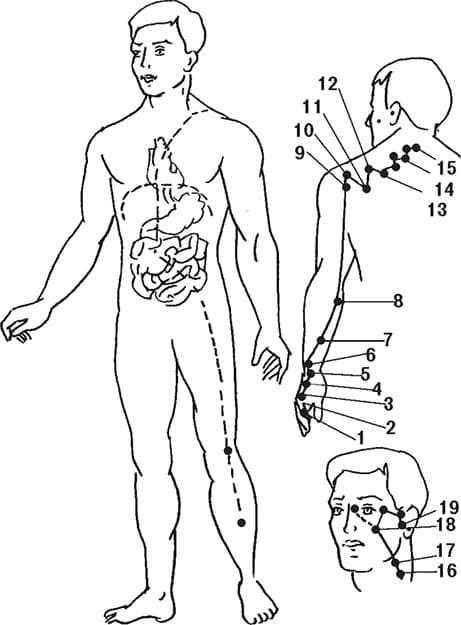
The Small Intestine Meridian (IG)
The meridian of the small intestine belongs to the system of manual Yang channels. Its pair is the meridian of lungs, and its element is fire. It receives energy coming from the meridian of the heart and transmits it to the meridian of the bladder through 19 points. The maximum activity of the meridian of the small intestine is from 13:00 to 15:00 hours, and the time of minimum activity is from 1:00 to 3:00 am.
Functions of The Small Intestine Meridian
The function of separating pure, transparent and turbid liquids, where the pure part is the feeding substance. The transparent part is absorbed and directed through the spleen and distributed throughout the body. The turbid part is sent to the large intestine and bladder.
Controlling the absorption of nutrients and fluids, can influence the mental state of a person. Paired to it is the meridian of the heart. Both meridians pass very close to each other. Any heart problems affect the condition of the small intestine, and any abnormalities in the small intestine trigger problems with the heart and blood circulation.
It begins at the very edge of the nail of the little finger of the hand from the outside, passes along the back of the finger, the edge of the palm, the back surface of the forearm and shoulder. It rises, crosses the shoulder joint, the scapular area, passes along the neck, rises along the cheek, reaching the zygomatic bone, makes a turn and ends at the very tragus of the ear.

Symptoms and diseases with an imbalance of The Small Intestine Meridian
A sign of redundancy
Pain in the neck; pain in the back of the head, temples; ringing in the ears; pain in the lower abdomen; pain in the navel; constipation; pain on the back of the forearm and shoulder.
A sign of insufficiency
Tinnitus, the cause of hearing loss, swelling in the neck and lower jaw, weight loss, vomiting, nausea, diarrhea, weakness in the extremities and a feeling of cold in the extremities.
Diseases of The Small Intestine Meridian
Diseases associated with the meridian of the small intestine: hearing loss, tinnitus, deafness, yellowness in the eyeballs, tension and pain in the shoulders, elbow joint, hands, fingers, throat, occasional abdominal pain, inflammation of the oral cavity, herpes, pain in the occipital region, tinnitus, conjunctivitis, nose bleeds, pain in the occipital part, inflammatory processes in the jaws, pain in the outer surface of the hand, feverish conditions, mental disorders, convulsions in children, difficulty in the act of sucking decreased visual acuity, arthritis of the upper limb, hyperemia and pain on the outer surface of the shoulder and forearm, lower back pain, pain in the submandibular region and neck, pain in the shoulder joint, in the little finger of the hand, epileptiform seizures.